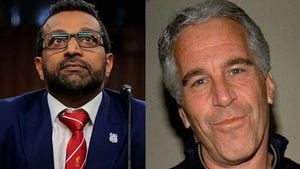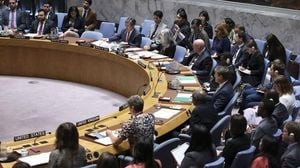The Trump administration is weighing whether to publicly release an audio recording of a previously undisclosed interview between Ghislaine Maxwell and senior Department of Justice officials, focusing on the late Jeffrey Epstein. According to a report by The Independent, the existence of this recording was not known until recently, and discussions are currently underway about whether to also release a transcript of the conversation between Maxwell and Deputy Attorney General Todd Blanche.
Maxwell, now 63, is serving a 20-year sentence following her 2021 conviction for her role in a scheme to sexually exploit and abuse multiple girls alongside Epstein. Her legal team has since appealed the conviction to the Supreme Court, but the case remains a flashpoint in the ongoing debate over transparency and accountability in high-profile criminal matters.
The interview in question took place amid mounting pressure on the Trump administration to be more forthcoming about the Epstein case. This pressure intensified after a July 6, 2025, memo from the Department of Justice declared that Epstein died by suicide in 2019 and found no evidence to support persistent rumors of a so-called "client list"—claims that have fueled speculation and uproar, particularly among Trump’s MAGA supporters.
Despite the growing calls for transparency, as of the morning of August 5, 2025, no final decision had been made regarding the release of either the audio or the transcript. Some officials within the administration have voiced concern that making the interview public could reignite the Epstein controversy—a story many close to the president believe has largely faded from public consciousness. According to CNN, these officials worry that renewed scrutiny could overshadow other administration priorities.
When pressed for comment by The Independent, the administration denied that any decisions were being made about the transcript, stating that former President Trump had already addressed the issue. Steven Cheung, White House Communications Director, dismissed the reports as media sensationalism, stating, "This is nothing more than CNN trying desperately to create news out of old news. He already addressed this issue in an interview with Newsmax, a real news outlet that routinely gets better ratings than CNN."
Transparency concerns over the Epstein-Maxwell affair are not new. Trump previously asked Attorney General Pam Bondi to make public "any and all pertinent" grand jury transcripts in both the Epstein and Maxwell cases, hoping to quell ongoing speculation. In response, a judge overseeing Maxwell’s case requested the government provide more information to the court. The Department of Justice subsequently delivered a version of the transcripts, indicating which portions were not publicly available. However, in a filing on August 4, 2025, Bondi admitted that "much" of the information in the transcripts was already accessible to the public.
The debate over transparency has only intensified following the Department of Justice’s announcement earlier in 2025 that its review of Epstein-related files found insufficient evidence to warrant investigating any individual not already charged. The DOJ declined to open any additional probes, a decision that has sparked widespread backlash and appears to contradict earlier hints from Attorney General Bondi that more information could be forthcoming.
Pressure on the DOJ has mounted from multiple directions. Congress has launched a new probe into the handling of the Epstein case, while Trump continues to demand the release of grand jury testimony. The controversy has spilled over into state-level politics as well, with three Republican candidates in Alabama’s 2026 Attorney General race weighing in on the legal implications.
Katherine Robertson, chief counsel to Alabama Attorney General Steve Marshall and a former DOJ official, expressed her support for releasing all unsealed Epstein-Maxwell documents. In a statement to Yellowhammer News, she said, "In the interest of transparency and reviving public confidence in our government, these documents should be released. Of course, this information should be released in a manner that prioritizes the protection of victims and adheres to the highest standards of legal integrity."
Former Alabama Supreme Court Justice Jay Mitchell, another candidate, emphasized his trust in Trump’s approach over that of the Biden administration. "After years of Democrats and their media enablers weaponizing the Department of Justice, I trust President Trump and his team to handle this issue appropriately and seriously," Mitchell said. He further pledged to focus on the safety of Alabama citizens and to "end the lawfare against President Trump and conservatives everywhere" if elected.
Pamela Casey, District Attorney of Blount County, also supports transparency but stresses the importance of safeguarding victims’ identities. "While I support the President’s efforts to unseal the grand jury testimony, my experience as a career prosecutor reminds me that there are valid and important reasons investigative files are often kept sealed—chief among them, the need to protect the identities and safety of sex abuse victims," Casey said. She voiced concerns about the Biden administration’s exclusive control of these files over the past four years, suggesting this raises "legitimate concerns about the integrity of the evidence and whether any tampering or mishandling has occurred."
The candidates also addressed the possibility of securing crucial testimony from Ghislaine Maxwell, with some openness to offering incentives or partial immunity in exchange for her full disclosure about Epstein’s clients. Robertson stated, "I would consider incentives in exchange for Ms. Maxwell’s testimony, as I believe that exposing the truth in this matter would best serve the public interest." Casey added that prosecutors must first ascertain the value of Maxwell’s information before making any deals. "When a defendant possesses valuable information that could lead to the prosecution and conviction of individuals who might otherwise evade justice, it’s sometimes necessary to offer incentives in exchange for cooperation. That appears to be the approach the Department of Justice is now pursuing with Maxwell," she observed.
All three Alabama candidates agreed that if credible allegations arise, investigations should proceed regardless of the political or financial status of those implicated. Robertson was unequivocal: "All credible allegations should be investigated." Casey echoed this sentiment, emphasizing, "Politics and financial status have no place in decisions regarding the administration of justice. I have spent my career as a prosecutor protecting sex abuse victims of all ages. No one should ever turn a blind eye when there is solid evidence that a crime has occurred."
Past investigations into Epstein’s network have been criticized for their limited scope and secrecy, fueling public suspicion that powerful figures may have been shielded from scrutiny. Robertson highlighted the need for both justice and transparency, but cautioned against politically motivated probes. "I would support an additional review by Congressional Republicans, for instance, but would caution that, too often, independent reviews have been weaponized in the past against President Trump and were conducted with no intention of getting to the truth," she said.
As the debate rages on, the Trump administration’s decision on whether to release the Maxwell audio and transcript could prove pivotal in shaping public trust—either reaffirming calls for transparency or deepening suspicions of political maneuvering. For now, the nation waits, eyes fixed on the next move in a saga that refuses to fade quietly into history.




